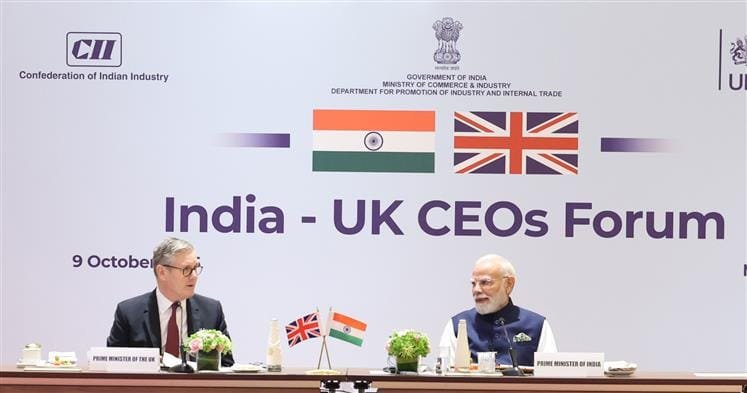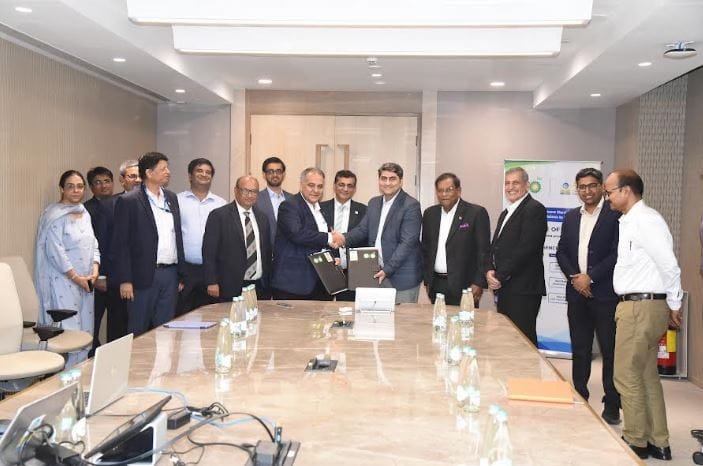Starmer led 125 UK CEOs to work on Indian market
Prime Minister Narendra Modi and UK Prime Minister Keir Starmer held restricted as well as delegation-level talks in Mumbai on 9 Oct 2025, where they expressed satisfaction at the upward trajectory of the India-UK Comprehensive Strategic Partnership.
The two leaders reaffirmed common commitment to global peace, stability, and a rules-based international order.
Starmer paid official visit to India 8-9 Oct.
They also discussed global and regional issues of mutual interest.
The UK Prime Minister Starmer was accompanied by a high-level delegation including Secretary of State for Business and Trade and President of the Board of Trade Peter Kyle, Secretary of State for Scotland Douglas Alexander, Minister for Investment Jason Stockwood, and 125 CEOs, entrepreneurs, university Vice Chancellors and cultural leaders.
This was Prime Minister Starmer’s first official visit to India. The visit follows the visit of Prime Minister of India to the United Kingdom on 23–24 July 2025, during which both sides signed the historic India–UK Comprehensive Economic and Trade Agreement (CETA) and adopted the India – UK Vision 2035 and a Defence Industrial Roadmap.
The Prime Ministers welcomed the meeting of the CEO Forum in Mumbai on the sidelines of the India-UK Summit. Both leaders looked forward to the ratification of the India–UK Comprehensive Economic and Trade Agreement (CETA) as early as possible to realise its benefits.
The Prime Ministers also welcomed the resetting of the Joint Economic and Trade Committee (JETCO) which will support the governance and utilisation of the CETA and drive forward our wider trade and investment partnership.
The strong business delegation accompanying UK Prime Minister demonstrated the opportunities for investment in both countries in the focus sectors of construction, infrastructure and clean energy, advanced manufacturing, defence, education, sport, culture, financial and professional business services, science, technology and innovation, consumer goods and food.
The existing UK India Infrastructure Financing Bridge (UKIIFB), between NITI Aayog and City of London Corporation, is an example of our shared ambitions for sustainable growth.
Both Prime Ministers reiterated their commitment to improving connectivity and enhancing cooperation in the aviation sector and welcomed that both sides are discussing the renewal of India-UK Air Services Agreement, along with other aviation related matters. This provides an opportunity for both countries for closer cooperation across the aerospace sector.
Technology and Innovation
The Prime Ministers of India and the United Kingdom reaffirmed their shared commitment to harnessing frontier technologies to drive inclusive economic growth, strengthen national security, and shape the future of global innovation. Building on the landmark Technology Security Initiative (TSI), both leaders welcomed the tangible progress made across critical and emerging technologies, including telecommunications, critical minerals, AI, and health tech.
Under the TSI, the leaders expressed happiness at the establishment of:
• The India–UK Connectivity and Innovation Centre, a joint hub focused on developing AI native network for 6G, Non-Terrestrial Networks (NTNs), and cyber security for telecoms, with at least £24m of joint funding in the first phase of the project.
• The India–UK Joint Centre for AI, advancing responsible and trustworthy AI across health, climate, fintech, and engineering biology.
• UK – India Critical Minerals Processing and Downstream Collaboration Guild to build concrete partnerships which strengthen and diversify critical mineral supply chains and deliver investment and growth in both nations. They also announced Phase 2 of the UK-India Critical Minerals Supply Chain Observatory to expand Mineral coverage, further integrate advanced technologies, unlock new bilateral investment opportunities and establish a new satellite campus at IIT-ISM Dhanbad.
The UK and India continue to work together to advance biotechnology with strategic partnerships being signed between institutions like Centre for Process Innovation (CPI) UK and Biotechnology Research and Innovation Council (BRIC) institutions in India, Henry Royce Institute (HRI) and Indian Institute of Science (IISc), Oxford Nanopore Technologies (ONT) and BRIC – Centre for DNA Fingerprinting and Diagnostics (BRIC-CDFD), to deliver transformative outcomes in Biomanufacturing, 3D Bioprinting, and Genomics.
Defence and Security
The Leaders agreed to expand bilateral exchanges between the armed forces of India and UK through joint exercises, training and capacity building. Prime Minister Modi welcomed the port call of UK’s Carrier Strike Group and the Royal Navy’s exercise KONKAN with the Indian Navy. Both sides committed to robust maritime security collaboration in the Indo-Pacific, including establishment of the Regional Maritime Security Centre of Excellence (RMSCE) under the Indo-Pacific Oceans Initiative (IPOI).
In the context of cooperation on training, the two Leaders welcomed progress on an arrangement that will see Indian Air Force Qualified Flying Instructors integrated into UK Royal Air Force training, alongside an agreement that will facilitate our strong training and education relationship.
Both Prime Ministers are pleased to the intent to finalize an India – UK Inter-Governmental Agreement (IGA) on cooperation in developing maritime electric propulsion systems for Indian Naval platforms.
Both leaders also announced the agreement to proceed via government to government route on an initial supply of Lightweight Multirole Missile (LMM) systems. This will further support India’s air defence capabilities and, in the spirit of Atmanirbhar Bharat, meet the current and future requirements of the Indian Ministry of Defence, and support a long-term collaboration on complex weapons between the two countries.
The two Prime Ministers unequivocally and strongly condemned terrorism and violent extremism in all its forms and manifestations. They called for zero tolerance for terrorism and concerted international efforts to combat terrorism in a comprehensive and sustained manner, in accordance with the UN Charter and international law. They agreed to counter radicalisation and violent extremism; combat financing of terrorism and the cross-border movement of terrorists; prevent exploitation of new and emerging technologies for terrorist purposes; tackle terrorist recruitment; enhance cooperation in information sharing, judicial co-operation, capacity building; and strengthen bilateral and multilateral co-operation in these spheres, including at UN and FATF. They condemned in the strongest terms the April 2025 terrorist attack in Pahalgam, Jammu and Kashmir. They committed to strengthen co-operation to take decisive and concerted actions against globally proscribed terrorists, terror entities and their sponsors.
Climate and Energy
The Leaders reaffirmed the importance of collaboration to achieve net-zero goals. The Prime Ministers welcomed the ‘India-UK Climate Finance Initiative’ to enable scaling up of climate finance, unlocking green growth and new financing opportunities for both countries They announced a new joint investment in the Climate Tech Start-up Fund. This strategic initiative, under the MoU between the UK Government and State Bank of India, will enhance support for innovative entrepreneurs working in frontier sectors such as climate technology and AI, driving innovation and fostering growth.
The Leaders welcomed the establishment of Offshore Wind Taskforce. They reiterated their intent to explore possibilities for working together through the Global Clean Power Alliance (GCPA).
Education, Culture and People to People
The leaders underlined the importance of youth, cultural and educational exchanges in shaping the future of the bilateral relationship. They expressed commitment to the first Annual Ministerial Strategic Education Dialogue, and the implementation of the Programme of Cultural Co-operation signed by both Ministers of Culture in May 2025.
Acknowledging education as a key area of bilateral cooperation, both sides expressed happiness on the progress in opening of campuses of nine leading UK universities in India. The University of Southampton has welcomed its inaugural cohort of Indian students to its campus in Gurugram. The University Grants Commission has also handed over Letters of Intent (LoI) for establishment of branch campuses of University of Liverpool, University of York, University of Aberdeen and University of Bristol in India. Further, Queens University of Belfast and Coventry University have been authorised to open their branch campuses in GIFT City. During the visit, Indian authorities also handed over the LoI for opening of campus of Lancaster University in Bengaluru and accorded in-principle approval for opening campus of University of Surrey in GIFT City.
The Prime Ministers expressed their commitment to continue implementing the Migration and Mobility Partnership (MMP). While noting the progress in cooperation for curbing irregular migration, both sides reiterated their commitment to continue collaboration in this domain.
Both Leaders recognised the Indian diaspora in the United Kingdom as a living bridge between the two countries and appreciated its contribution to strengthening bilateral economic, cultural, and societal links. The Leaders acknowledged the potential of the UK-India Programme of Cultural Cooperation to bring together the talent in both countries in the areas of Culture, Creative Industries, Arts, Tourism and Sports.
Regional and Multilateral Cooperation
The Prime Ministers reiterated their shared commitment to global peace, prosperity and a rules-based international order. They agreed to work closely in promoting reformed multilateralism, including reform of the United Nations Security Council (UNSC). The UK reiterated its long-standing support for India’s legitimate aspirations for permanent membership in a reformed UNSC.
The Leaders acknowledged that the shared values of 2.5 billion peoples spread across diverse geographies constituting the Commonwealth was its strength. They agreed to work closely in the areas of Climate Change, Sustainable Development, and Youth Engagement with the new leadership at the Commonwealth Organisation.
The two Prime Ministers expressed support for a just and lasting peace in Ukraine in accordance with international law, including the UN Charter. They welcomed the ongoing diplomatic efforts by various countries to achieve this.
They reiterated their commitment to peace and stability in the Middle East, calling for restraint, protection of civilians and to comply with international law, and refrain from taking actions that could further escalate the situation and compromise regional stability. They expressed their support for the US peace plan for Gaza and their commitment to working with regional partners to secure an immediate and lasting ceasefire, the release of the hostages and the delivery of humanitarian aid, and their shared commitment to a lasting and just peace as a step towards a Two-State solution, with a safe and secure Israel, alongside a viable Palestinian state.
Prime Minister Starmer thanked Prime Minister Modi for the warmth and hospitality extended to him and members of his delegation. The visit reaffirmed the strong growth and positive trajectory of the India – UK Comprehensive Strategic Partnership which is built upon shared democratic values and deep and enduring bonds of friendship between the two countries.
List of outcomes during the UK PM visit;
I. Technology and Innovation
1. Establishment of the India-UK Connectivity and Innovation Centre.
2. Establishment of the India-UK Joint Centre for AI.
3. Launch of Phase II of the UK-India Critical Minerals Supply Chain Observatory and establishment of a new satellite campus at IIT-ISM Dhanbad.
4. Establishment of the Critical Minerals Industry Guild to secure resilient supply chains and promote green technologies.
II. Education
5. Handing over the Letter of Intent for opening of the Campus of Lancaster University in Bengaluru.
6. In-principle approval for opening of Campus of University of Surrey in GIFT City.
III. Trade and Investment
7. Inaugural meeting of the reconstituted India-UK CEO Forum.
8. Resetting the India-UK Joint Economic Trade Committee (JETCO) which will support implementation of the CETA and drive economic growth and job creation in both countries.
9. A new joint investment in the Climate Technology Startup Fund, a strategic initiative under the MoU between the Government of the UK and the State Bank of India for supporting innovative entrepreneurs in sectors such as climate technology and AI.
IV. Climate, Health and Research
10. Launch of Phase-III of Bio-Medical Research Career Program.
11. Establishment of the Offshore Wind Taskforce.
12. Letter of Intent (LoI) between ICMR and NIHR, United Kingdom on Health Research. Fiinews.com











